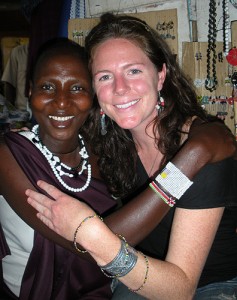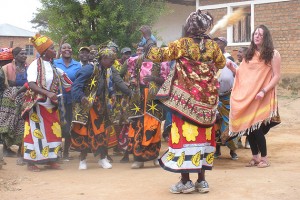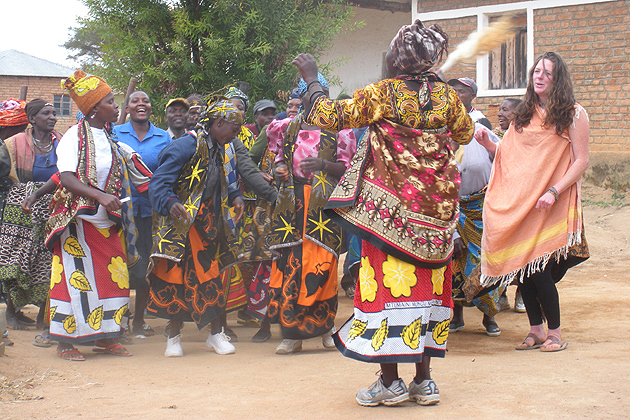
Zookeeper, beekeeper, bookkeeper. Farmer, teacher, fundraiser, Peace Corps volunteer. Non-profit director.
Greta Scheibel is using her UConn degrees in some unexpected ways.
Scheibel, the executive director of United Planet Tanzania, a volunteer organization based in Dar es Salaam, is in charge of placing volunteers from America and Europe with local host families while they work at orphanages and primary and vocational schools in Tanzania.
She received a BS degree in animal science from the College of Agriculture and Natural Resources in 2006 and a BA in English literature with a certificate in creative writing from the College of Liberal Arts and Sciences in 2007.
“Though it seems like my job has little to do with a degree in English literature, I wouldn’t be where I am today without it,” she says by email. “The English program at UConn taught me how to think dynamically, instead of purely scientifically, as I’d been taught in preparation of my BS in animal science. It opened my eyes to a world of characters and possibilities.”
Scheibel planned to join the Peace Corps right after graduation. But while she was waiting for an assignment, she taught English as a second language at a Massachusetts boarding school, and then landed a job as the zookeeper at a private children’s zoo.
“I achieved celebrity status amongst the children of the Upper East Side,” she says. “They knew me as ‘Farmer Greta.’”
But in June 2008, Scheibel packed the 60 pounds of luggage she was permitted to take and boarded a plane to East Africa to become an environmental extension agent in the Peace Corps in the United Republic of Tanzania
She spent the next two years in Ujindile, a mountain-top village in the southern highlands of Tanzania. The population was 1,200 people.
“I spent the early days learning basic village survival: to cook over charcoal, bathe from a bucket, speak Swahili, and dress like a proper Mbena woman – Bena being the tribe of our area,” she says. “Once I mastered the basics, I began my volunteer work. My main project was creating a beekeeping cooperative as an income-generating activity for people living with HIV/AIDS.”
She also taught a variety of classes for the community, including English, animal
husbandry, winemaking, and life skills.
When her stint in the Peace Corps ended, she says, she spent five “wonderful, comfortable months” in America. She told her mother that she would return to Tanzania only if the “perfect job” came along. It did.
“The next day, I received a job posting for United Planet Tanzania. A month later I was back there,” she says. “There’s something about Tanzania: an ancient place with deep traditions yet constant movement towards development; beauty and depravity; frustration and unexpected rewards. The only way to describe the country’s magnetism is that it makes you feel alive. It’s also exhausting.”
At United Planet Tanzania, she is responsible for administrative tasks, program development, marketing, budgeting, fundraising, and engaging with the volunteers, organizations, and families in the field.
“I am constantly learning new things and pushing my professional comfort zone,” she says.

“Who would have thought an English/animal science major would be handling operational budgets and establishing profit margins? Although I had no idea what I wanted to do when I graduated from college, I found my way to a job that I love by way of unexpected and wonderful experiences.”
The English department at UConn was an exciting place to be, she says. “There is so much passion in the English department – passion for literature, discussion, and perspective. On the technical side, I learned how to write effectively, which has been the single most important tool in my professional life.”
In the Peace Corps she says, she wrote constantly: journals, essays, blogs, grants, letters. One of the essays she wrote about her village was published this fall in a collection of essays edited by Regina Barreca, professor of English and Scheibel’s advisor.
She still occasionally blogs, she says. “Living as a young ex-pat in a country halfway around the world from family and close friends can make it difficult to stay grounded. Writing helps me process the craziness and beauty that can define life in Tanzania. It keeps me rooted in reality, however foreign that reality may be.”
Scheibel says Barreca was “an incredibly influential figure” in her academic career. “She challenged me academically, and took an interest in my personal goals and ambitions. In the classroom, she educated us on the technical aspects of writing as well as the business side. She encouraged me to develop my voice and have confidence in my writing. She showed by example that it’s possible to be a busy, successful, professional woman, and keep writing. We’ve continued to keep in touch, and today I count her as a close friend and mentor.”



